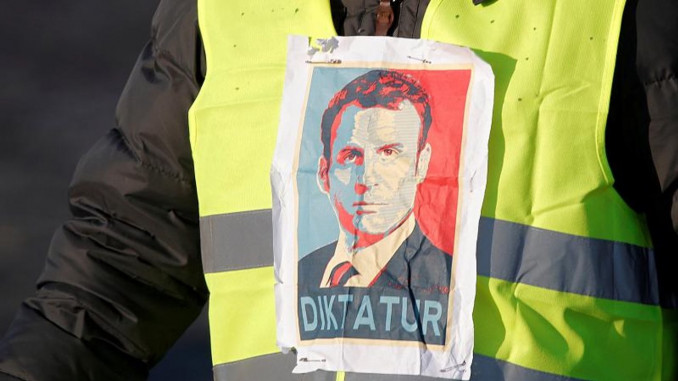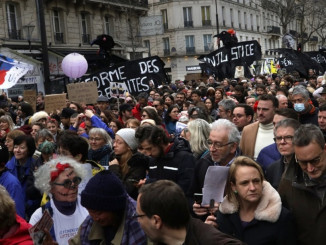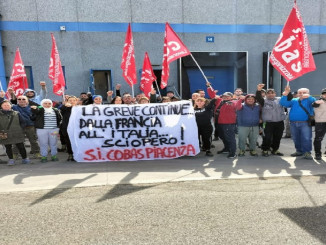
This “New Popular Ecological and Social Union” (NUPES) in the National Assembly cannot change the situation of the workers
Written by a militant of the L’étincelle Fraction of the New Anticapitalist Party (NPA) in France, translated from French.
Macron was re-elected President of the Republic in France on April 24 against Marine Le Pen, the candidate of the far-right party (the National Rally), as in 2017. Thus he begins his second term, although he is extremely hated by the working classes. Known by many as the president of the rich and the bankers, he was elected with 58.5% of the votes (against 41.4% for Le Pen) but with 28% abstaining, especially in working-class areas. This means that only 38% of the electorate voted for him. And many voted for Macron only to avoid experiencing the far-right in power for five years or more. All the parties that call themselves left-wing or Green, whose representatives have participated in past governments and submitted to the demands of the bourgeoisie in recent decades, called more or less directly for a vote for Macron, claiming that this will block the rise of the extreme right, while the experience of the last 5 years with Macron show us quite the opposite.
Macron, hated by the workers
His first term (2017-2022) was marked by many violent attacks against workers – the labor code was reformed in favor of the bosses; there were thousands of layoffs in essential public services such as health and education; he attempted to lower the retirement age again, and was prevented from doing so only by a large-scale strike, especially in the transportation sector during the winter of 2019-2020. His mandate was also marked by violent police repression of demonstrations and xenophobic policies.
This was entirely in line with previous governments, especially under the Socialist Party (SP) president François Hollande from 2012 to 2017. But Macron’s arrogance – his repeated contemptuous remarks about the working classes, those “nothings,” and his policies that support bourgeois demands in general – have exasperated many workers. The abolition of the wealth tax (ISF – Impôt de solidarité sur la fortune), while it is just a symbol next to the billions of gifts made to capitalist corporations, contributed to this as well. Currently in France, the top five richest individuals hold the equivalent wealth of the poorest 40%.
The Yellow Vest movement was started in October 2018 by workers without any particular membership in unions or parties, but who were tired of suffering the high cost of living, and the increase in fuel taxes, among other things. Macron, who was compared to Jupiter by his supporters and by the media at the beginning of his first term, experienced a thunderstorm in his Jupiterian sky. He was forced to grant small social benefits to the angry population, and to encourage employers to pay bonuses in the years that followed to calm the discontent. This is the case at this time as well because since the autumn of 2021, there has been an increase in strikes for wage increases at private companies with high profits. Workers have sometimes been able to win a 100-euro monthly raise with just a few days of strike action.
For many reasons, the disastrous management of COVID has deepened discontent, because of the lack of staffing in public hospitals, and also because of the successive lies and authoritarian measures, especially with regard to the unvaccinated. And now the galloping inflation (4.8% officially, but much higher for basic necessities) is further deepening inequalities. In this context, the far-right parties have pushed their advantage.
Electoral surge by the far right
The presidential election campaign was marked by two elements: on the one hand, a rise of the far right, the National Rally (RN), which garnered more than 13 million votes, 2.7 million more than in 2017. This party, already quite influential in working-class circles, has been hammering its anti-immigration demagoguery for decades. But this time it also ran a campaign emphasizing the decreased purchasing power of the working classes and against the reform announced by Macron to raise the retirement age from 62 to 65.
Another far-right party was created with the support of a billionaire who owns part of the media in France, Vincent Bolloré, who also helped launch a polemical journalist, Eric Zemmour, as the new candidate and leader of the party called Reconquête! (Reconquest!) This candidate led an openly racist and xenophobic campaign, stirring up the ghost of the “great replacement,” targeting the population of immigrant origin, particularly of Muslim faith. Demagogic artillery was used to try to divide the population. This new candidate, who in the end won 7% of the votes cast, took up an enormous amount of media time. He looked back in history and took sides with Philippe Pétain (the collaborationist marshal who had governed France during the Second World War from 1940 to 1944, under the Nazi occupation), and he advocated hatred of Muslims, unabashed misogyny and contempt for working-class people, who according to him were potential fraudsters of social security. For her part, the candidate of the traditional right-wing party (the Republicans), Valérie Pécresse, echoed the propaganda of the extreme right, to her loss and to the advantage of the extreme right, and won only 4.7% of the votes. Both Zemmour and Pécresse have mostly collected votes among the upper class.
In contrast, the other far-right candidate, Marine Le Pen, had the luxury of appearing more moderate and close to the workers, almost allowing us to forget the racist and anti-social nature of her propaganda. Disoriented, many workers voted for her, sometimes out of a simple rejection of Macron’s five years. And that included people in the French overseas territories like Martinique or Guadeloupe (West Indies) where a part of the population, including many young people, had just risen up against the high cost of living and the calamitous management of the pandemic in the fall of 2021. Macron had sent the police and the army to violently suppress the movement.
But also an electoral push to the “left”
On the other hand, there was a strong push towards a candidate who embodied a so-called “useful” vote on the left, Jean Luc Mélenchon. For many voters his candidacy represented above all a way to prevent finding themselves having to choose between Marine Le Pen, the racist, and Macron the ex-banker, in the second round. Mélenchon called for a “People’s Union,” the rebirth of a governmental left that was supposed to be more concerned with the interests of what he called the “people.” He promised a return to retirement at 60, a minimum wage of 1,400 euros (1,300 net today) and measures for an ecological transition.
He collected almost 22% of the votes in the first round. Not enough to make it to the second round, but what is notable is that he obtained very high scores among the popular electorate in the big cities. In the working class suburbs of Paris, he obtained an absolute majority in many places, but this also happened in the overseas territories mentioned above. The other so-called left-wing parties, such as the Socialist Party (SP), the Greens and the Communist Party (CP), saw their votes sucked in by Mélenchon’s candidacy and obtained only 1.7%, 4.6% and 2.2% respectively. Many voters reproached them for having dispersed the votes that would have allowed Mélenchon to reach the second round.
The two candidates of the far left, Philippe Poutou of the Nouveau Parti Anticapitaliste (NPA, translated as New Anticapitalist Party) and Nathalie Arthaud Lutte Ouvrière (LO, Workers Struggle), who campaigned on a program of social and revolutionary struggle against capitalism to be carried out beyond the elections, had very successful public meetings, especially those of the NPA, with a very young audience and which resulted in new memberships. But their votes were also sucked in by this pressure to cast a “useful” vote in favor of Mélenchon, and they obtained respectively 0.7% and 0.5% of the votes (about 465,000 voters).
The well-deserved discredit of the “left”
It is not surprising that the Socialist Party (SP) candidate, Anne Hidalgo, suffered a resounding electoral defeat after years of her party’s anti-worker policies as well as her own tenure as Mayor of Paris carrying out this same agenda. After having strongly disappointed the population in the 1980s, the SP governed from 1997 to 2002 with the help of ministers from the Communist Party (CP): this government, dubbed that of the “Plural Left,” privatized many large public companies, and made work more precarious and “flexible.” It was as a result of the disappointments created by this coalition that the far-right candidate Jean-Marie Le Pen (father of Marine le Pen) found himself in the second round of the presidential elections for the first time in 2002. Then from 2012 to 2017, there were Socialist Party governments under President François Hollande that did even worse: violent reforms of the labor code, defunding public hospitals, freezing civil servants’ salaries, anti-immigrant measures, repression of protesters, etc. These years ended the few remaining illusions about this so-called “left” that showered employers with hundreds of billions in public aid while satisfying the demands of the wealthy.
Mélenchon, “I, Prime Minister”
During this 2022 election, Jean Luc Mélenchon, just after the first round and having won 22% of the votes, stunned journalists with a declaration: he was prepared to become the next prime minister … whether it be in Macron’s cabinet or Le Pen’s. To pose as the supreme savior in a period when in France and elsewhere the bourgeoisie is imposing generalized impoverishment is a sure sign of the bluff that his political project represents.
In view of the up-coming legislative elections of June 12 and 19, he has launched negotiations to form a new union of the left with the Greens, the Communist Party and even the New Anticapitalist Party, initially excluding the Socialist Party, too discredited in previous governments. But very quickly a part of the Socialist Party walked in the door because it is likely to win elected representatives. This is how the “Nouvelle Union Populaire Ecologique et Sociale” (NUPES, translated as New Ecologic and Social People’s Union) was born on May 6th. This purely electoral alliance aims to divide up the seats of deputies and to constitute a very hypothetical majority in the National Assembly allowing so-called “comrade” Mélenchon to aspire to the post of prime minister. The NPA withdrew from this alliance because its leadership, engaged in illusory discussions for a “new left to fight and break with capitalism,” could accept neither the return of the Socialist Party nor the fact of not being allowed to run NPA candidates for the National Assembly in any districts.
A look at Mélenchon’s past
It is useful to take a look back. Mélenchon, a former socialist minister from 2000 to 2002, resigned from the SP to create his own small party in 2009 (the Left Party), at the time of the global economic crisis. In the wake of the protest movements that took place at that time, he joined the militant forces of the Communist Party and for a few years his organization participated in the Front de Gauche (a front of left-wing organizations). He was the candidate of this Front in the 2012 presidential elections (11% of the vote) and later left it to create a new movement in 2016, called “La France Insoumise” (Insubordinate France), with a more clearly nationalist bent.
Today, it claims to carry “insubordination” into the institutional framework, giving as its only perspective a new left-wing government or at worst a parliamentary group that would counterbalance Macron’s neoliberal policies. A certain momentum and hopes in militant circles of the left are allowing him to develop a fairly dynamic campaign. But this is bound to end with disillusionment. First, because it is unlikely (given the very undemocratic voting system) that this majority will actually come to be, or if it does that it will last very long, and because it is above all the battle for government posts as deputies that motivates these candidates. Chiefly however, the disillusionment will come about because of the greed of the bosses, who don’t bother with parliamentary debates. Their demands will make mincemeat out of the NUPES’ already very timid social program. Some choice tidbits of this program are, for example, to favor the purchase of French military equipment, or to democratize the employers’ union (MEDEF)! Real jewels of class collaboration!
The politics of the extreme left
Rather than lulling the working classes with such illusions, we should arm the workers for the coming struggles without expecting anything from the future government, whether “left” of “right.” For the needs are pressing: we need to impose wages that catch up with inflation, begin massive hiring in public services (health, education, transport, etc.), prohibit layoffs, control the accounts of large corporations and their polluting production, and many other urgent measures.
While Lutte Ouvrière is running in these legislative elections in more than 400 constituencies with a revolutionary program, the NPA, with a few rare exceptions, will not be present with the program that Philippe Poutou (the retired autoworker who was the Presidential candidate of the NPA) defended in the presidential elections and which inspired a small but significant fringe of the angered youth. By a small majority, the NPA leadership decided to support the NUPES candidates (excluding SP candidates or others considered too “social neoliberal”), including with its militant forces. Their analysis was that an impulse towards these candidates would allow us to fight off the growth of the extreme-right and raise the morale of those who want to fight. According to them, this would be a springboard for the struggles that we need to wage. Their analysis is not only risky, but constitutes a real political error. As we wrote in a recent headline of l’Etincelle (our workplace newsletter), “Not all of us Agree with the Choices of the NPA: Not Even Close!”
This moment in history calls for an entirely different and urgent task for revolutionaries. What made the presence of the revolutionaries so important during the presidential elections was their ability to address the population broadly, with a program of struggle that responds to the needs and aspirations of the exploited and of the youth in revolt. Now it is urgent to organize the few thousand who came to these meetings, and to help them defend a policy that holds out the overthrow of capitalism as the only perspective for the future.




